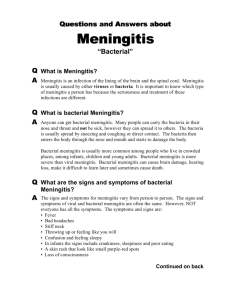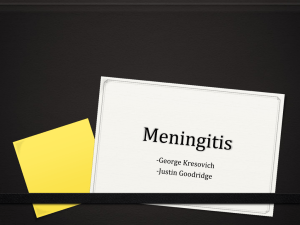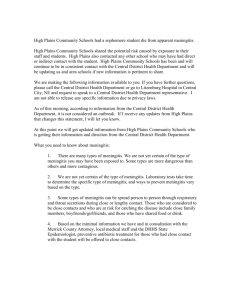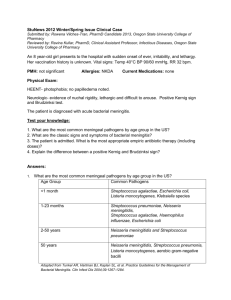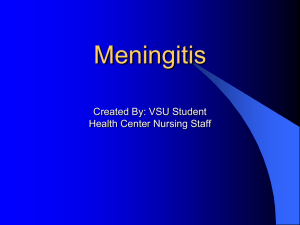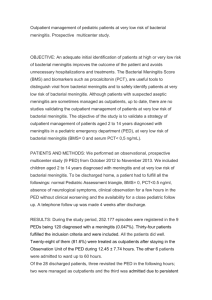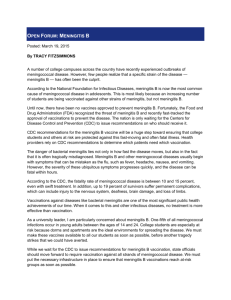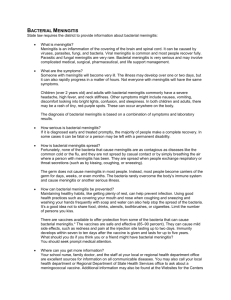Meningitis Questions & Answers
advertisement
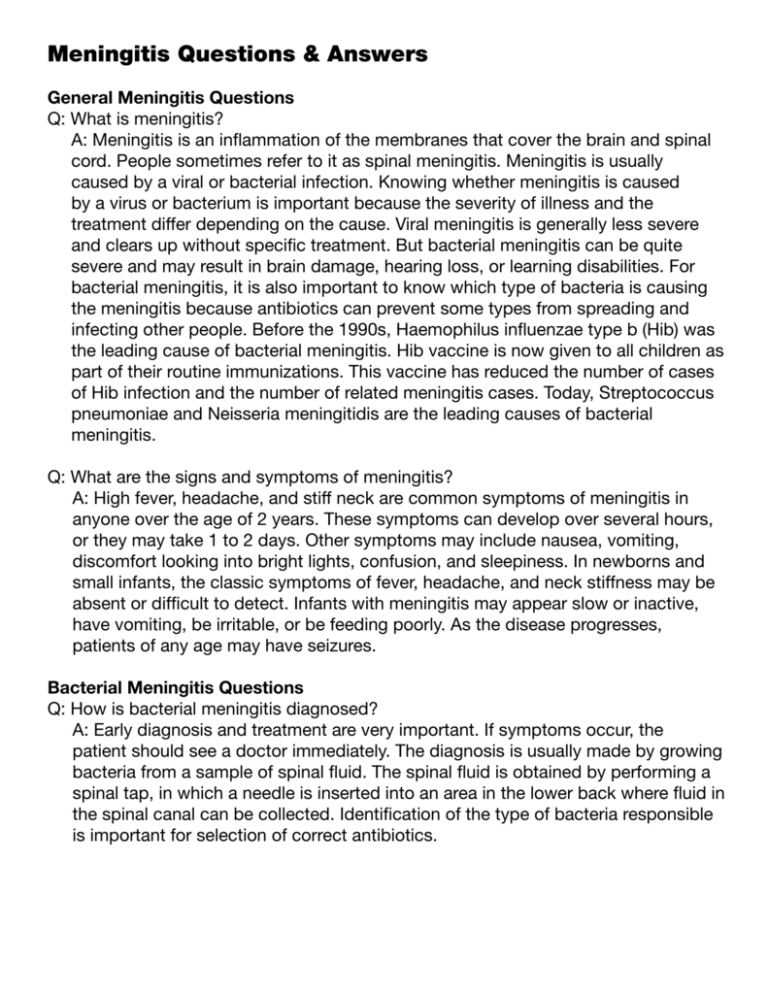
Meningitis Questions & Answers General Meningitis Questions Q: What is meningitis? A: Meningitis is an inflammation of the membranes that cover the brain and spinal cord. People sometimes refer to it as spinal meningitis. Meningitis is usually caused by a viral or bacterial infection. Knowing whether meningitis is caused by a virus or bacterium is important because the severity of illness and the treatment differ depending on the cause. Viral meningitis is generally less severe and clears up without specific treatment. But bacterial meningitis can be quite severe and may result in brain damage, hearing loss, or learning disabilities. For bacterial meningitis, it is also important to know which type of bacteria is causing the meningitis because antibiotics can prevent some types from spreading and infecting other people. Before the 1990s, Haemophilus influenzae type b (Hib) was the leading cause of bacterial meningitis. Hib vaccine is now given to all children as part of their routine immunizations. This vaccine has reduced the number of cases of Hib infection and the number of related meningitis cases. Today, Streptococcus pneumoniae and Neisseria meningitidis are the leading causes of bacterial meningitis. Q: What are the signs and symptoms of meningitis? A: High fever, headache, and stiff neck are common symptoms of meningitis in anyone over the age of 2 years. These symptoms can develop over several hours, or they may take 1 to 2 days. Other symptoms may include nausea, vomiting, discomfort looking into bright lights, confusion, and sleepiness. In newborns and small infants, the classic symptoms of fever, headache, and neck stiffness may be absent or difficult to detect. Infants with meningitis may appear slow or inactive, have vomiting, be irritable, or be feeding poorly. As the disease progresses, patients of any age may have seizures. Bacterial Meningitis Questions Q: How is bacterial meningitis diagnosed? A: Early diagnosis and treatment are very important. If symptoms occur, the patient should see a doctor immediately. The diagnosis is usually made by growing bacteria from a sample of spinal fluid. The spinal fluid is obtained by performing a spinal tap, in which a needle is inserted into an area in the lower back where fluid in the spinal canal can be collected. Identification of the type of bacteria responsible is important for selection of correct antibiotics. Q: Can bacterial meningitis be treated? A: Bacterial meningitis can be treated with a number of effective antibiotics. It is important, however, that treatment be started early in the course of the disease. Appropriate antibiotic treatment of most common types of bacterial meningitis should reduce the risk of dying from meningitis to below 15%, although the risk is higher among the elderly. Q: Is bacterial meningitis contagious? A: Yes, some forms of bacterial meningitis are contagious. The bacteria can mainly be spread from person to person through the exchange of respiratory and throat secretions. This can occur through coughing, kissing, and sneezing. Fortunately, none of the bacteria that cause meningitis are as contagious as things like the common cold or the flu. Also, the bacteria are not spread by casual contact or by simply breathing the air where a person with meningitis has been. However, sometimes the bacteria that cause meningitis have spread to other people who have had close or prolonged contact with a patient with meningitis caused by Neisseria meningitidis (also called meningococcal meningitis) or Hib. People in the same household or daycare center, or anyone with direct contact with a patient’s oral secretions (such as a boyfriend or girlfriend) would be considered at increased risk of getting the infection. People who qualify as close contacts of a person with meningitis caused by N. meningitidis should receive antibiotics to prevent them from getting the disease. This is known as prophylaxis. Prophylaxis for household contacts of someone with Hib disease is only recommended if there is 1 household contact younger than 48 months who has not been fully immunized against Hib or an immunocompromised child (a child with a weakened immune system) of any age is in the household. The entire household, regardless of age, should receive prophylaxis in these cases. Q: Are there vaccines against bacterial meningitis? A: Yes, there are vaccines against Hib, against some serogroups of N. meningitidis and many types of Streptococcus pneumoniae. The vaccines are safe and highly effective.
